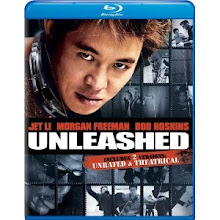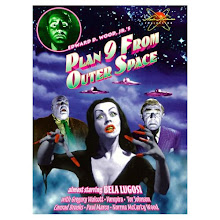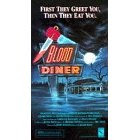Saturday, July 26, 2008
Our Inescapable, Subjective Baggage
First of all — man, I love these posts! I’ve already had my socks knocked off. This site is already a million times cooler than I ever thought it could be. It’s a masterpiece — already! tee he. I feel like a little fish swimming in a deep pond with a bunch of big fishes. … I only hope I don’t end up sleeping with the fishes. And by the way, it might take me a day or two to respond due to my two-job schedule, but I will respond.
As for disagreeing, that will be an unavoidable, pervading feature to this blog; in fact, it is a welcome benefit. As an aspiring movie critic, I myself want to develop a better ability to consider the cinema and to discuss and debate it intelligently. In fact, I've already been humbled by the enlightenment I've received thus far. Indeed, the more I think about it, probably most of the posts on this blog will end up being debates, which is fine, so long as we keep them friendly and professional. Yes, the only restriction I've set is that we wage no personal attacks (and I don't think any of us have). The people I’ve invited to participate in this film club can hold their own, believe me. Almost every one of us is either a professional or an aspiring professional. In every case, we're all willing students of film. We'll just make sure we keep it fun. I already love this blog and I thank you all for contributing your expertise. You all have my permission and encouragement to “get up in my mix” anytime you feel I deserve it. I, too, want to learn.
Having considered Barrett Hilton’s articulate remarks on why he personally feels “The Dark Knight” is a masterpiece, I must concede that if Barrett wants to call it a masterpiece, he’s earned that right (not that I’m the judge of who’s sufficiently convincing enough to be taken seriously).
As for my calling “The Dark Knight” a masterpiece, I’ll let you know in about a year ….
Oh, and one other thing on “The Dark Knight”: I thought it was hilarious when Andrew asked “Why is Batman standing around talking to everyone all the time?”
Next, I’d like to address a comment Mr. Andrew James made. He wrote to Barrett, “I think perhaps you are projecting your own feelings and judgments onto the film and seeing what you want.”
My response to that is who doesn’t do that? Whether we’re watching “Uncle Buck” or “Apocalypse Now,” we respond, recoil, relate, etc. to films based on our own range of life experiences. Every moviegoer (as well as every filmmaker) sees and therefore interprets and understands motion picture content through subjective eyes. And just as it’s impossible for a documentarist to make a truly unbiased film, since “even the placement of the camera incorporates bias,” it’s also impossible for any viewer, yes, any, to watch a movie without projecting his or her own feelings and judgments onto the film and seeing what he or she wants to see.
Yes, I’ve thought of this very concept for quite some time. Why? Because I’m a movie critic. What’s that got to do with it? I am continually perplexed at the disparity of opinions about a film between any two people. One person might think a movie is the best ever, while another person thinks it’s the worst. How does that happen? One reason it happens is because each of us brings our entire life experience into the theater with us. It’s unavoidable.
I was impressed with Professor Bernard’s academic preface to his “Gates of Heaven” comment. Did I actually see a citation in there? Whoa. But seriously, thanks for taking the time to write that. I’m so thankful for the way you guys are raising the bar, intellectually, so we don’t have a lot of general remarks like “That movie sucked,” or “It was the best movie ever — the end.”
I have to confess, Torben, that I am one of those explicit-seeing people who thinks “Gates of Heaven” is usually rather boring and about pet cemeteries, but not really. The comments you all have contributed have enlightened me, but I have always thought (even after this viewing) that Morris loses focus. He begins with precision, looking at the pet cemetery fiasco. Then, it’s like he loses focus and becomes more interested in the peculiarities of these people, and the documentary shifts from pet cemeteries to these people’s individual lives.
I suspected (and I’d like to hear Andrew’s thoughts on this point), that the interviewees in the latter half of the film, particularly the two sons, didn’t want to talk much about the pet cemetery. They were asked about it, they commented on it briefly, and then took off in their own direction, talking about the points of their lives that interested them. Perhaps these kind of deflections were all Morris had to work with in the editing room, or he was more interested in the peculiar people than the pet cemetery story. I think the doc loses focus and starts falling apart in the second half, so to compensate, Morris interviewed a couple pet owners, gave us shots of the headstones and some plastic animals and that was that. Tell me, documentarists, do you think there’s any truth to that?
But bravo, Torben, for your thoughts. Your arguments were convincing. And I can agree now, that Morris probably was being respectful, but I still think he was “smiling behind his camera” at his subjects, as Ebert said.
Everyone, I appreciate your participation and comments on “Gates of Heaven.” Tomorrow begins our week discussing the Coen brothers’ “Fargo,” a fine selection by Bill Barnes. (Send me your movie selection, if you haven't already.)
You’ll notice that I’ve listed the contributors on the right side. I’m planning to link all our names to the site that best represents us, in case your fellow contributors want to get to know you better. For instance, I linked my name to my movie review site. So send me an e-mail at ConsideringTheCinema@gmail.com with the link you’d like me to use to represent you.
Subscribe to:
Post Comments (Atom)






























































1 comment:
I appreciated your comment in response to Andrew about projecting our own feelings and experience onto films. Of course we all do that, I am totally agreeing with you. That is what makes art interesting, if there were some objective way of interpreting it, we'd have no questions, differing feelings, and there would be no mystery or ambiguity to anything. In my mind, (this is a generality) the better the piece (painting, film, sculpture, whatever) the more controversial it will be, and the wider range of opinions it will draw from people. I think that we (including myself) sometimes forget this fact and start to feel like we have some kind of objective insight or viewpoint on a film, or other piece of art. This is mostly because we feel so strongly about something, which is great, we only need to remember that others will feel just as strongly with a contrary view. I do believe in having experience, and more experience generally allows for a more informed viewpoint. But even then, a beginner's mind can pick out things that an experienced mind has sort of become numb to. With all art I try to see with fresh eyes/a beginner's mind, while also letting my experience inform my overall thought process about my experience. ...i'm sure the point has been taken...now i'm just ranting...
Post a Comment